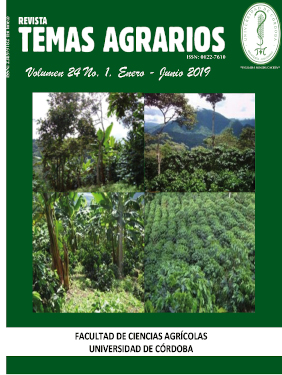Multiple Imputations, tool for the estimation of missing data in regression modeling
Imputaciones múltiples, herramienta para la estimación de datos faltantes en la modelación de regresión
Show authors biography
In recent years there has been an increase in research on missing data problems, with multiple imputation being a fundamental alternative; where data sets often present complexities that are currently difficult to manage appropriately in the probability framework, but relatively simple to deal with imputation; For this reason, this article describes a series of practical aspects to apply this methodology in the case of carbon capture modeling for Colombia, based on the World Bank databases including missing data reaching R2 of 79.2988%, highlighting that when estimating said data and recalculating the respective model, a greater R2 is evidenced, being of 94.76901%, which evidences a substantial improvement of the respective multiple linear regression model as such.
Article visits 894 | PDF visits
Downloads
- Allison, P. 2002.Missing data. Newbury Park, CA: Sage. Asparouhov, T., & Muthen, B. (2010). Multiple imputation with Mplus. Retrieved from: http://www.statmodel.com/download/Imputations7.pdf
- Carpenter, J. and Kenward, M. 2013. Multiple imputation and its application. West Sussex, UK: Wiley.
- Collins, L., Schafer, J. and Kam, C. 2001. A comparison of inclusive and restrictive strategies in modern missing data procedures. Psychological Methods, 6,330e351.
- Enders, C. 2010. Applied missing data analysis. New York: Guilford Press.
- Gelman, A., Carlin, J., Stern, H., Dunson, D., Vehtari, A. and Rubin, D. 2014. Bayesian data analysis (3rd ed.). Boca Raton, FL: CRC Press.
- Graham, J. 2012. Missing data: Analysis and design. New York:Springer.
- Jelicic, H., Phelps, E. and Lerner, R. 2009.Use of missing data methods in longitudinal studies: The persistence of bad practices in developmental psychology.
- Jimenez, J. and Mejía L. 2014.Multivariate Stochastic Analysis CO2 emission factor for carbon sequestration and sustainable development for Colombia. Ugciencia 20, 64-71.
- Little, R. and Rubin, D. 2002.Statistical analysis with missing data. Hoboken, NJ: Wiley.
- Meng, X.1994. Multiple-imputation inferences with uncongenial sources of input. Statistical Science, 9, 538e558.
- Peugh, J. and Enders, C. 2004. Missing data in educational research: A review of reporting practices and suggestions for improvement. Review of Educational Research, 74, 525e556.
- Raghunathan, T., Lepkowski, J., Van Hoewyk, J. and Solenberger, P. 2001. A multivariate technique for multiply imputing missing values using a sequence of regression models. Survey Methodology, 27, 85e95.
- Raykov, T. 2011. On Testability of missing data mechanisms in incomplete datasets. Structural Equation Modeling: A Multidisciplinary Journal, 18(3), 419e429.http://dx.doi.org/10.1080/10705511.2011.582396.
- Rubin, D. 1976. Inference and missing data. Biometrika, 63, 581e592.
- Rubin, D. 1987. Multiple imputation for nonresponse in surveys. Hoboken, New Jersey: Wiley.
- Rubin, D. 1996.Multiple imputation after 18þ years. Journal of the American Statistical Association, 91, 473e489.
- Schafer, J. 1997.Analysis of incomplete multivariate data. New York: Chapman &Hall.
- Schafer, J. 2003.Multiple imputation in multivariate problems when the imputation and analysis models differ. Statistica Neerlandica, 57, 19e35.
- Schafer, J. and Graham, J. 2002. Missing data: Our view of the state of the art. Psychological Methods, 7, 147e177.
- Van Buuren, S. 2012. Flexible imputation of missing data. New York: Chapman &Hall.
- Van Buuren, S., Brand, J. Groothuis-Oudshoorn, C. and Rubin, D. 2006. Fully conditional specification in multivariate imputation. Journal of Statistical Computation and Simulation, 76, 1049e1064.
- Widaman, K. 2006. Missing data: What to do with or without them. Monographs of the Society for Research in Child Development, 71, 42e64.
- Wood, A., White, I. and Thompson, S. 2004. Are missing outcome data adequately handled? A review of published randomized controlled trials in major medical journals.Clinical Trials, 1, 368e376.




















